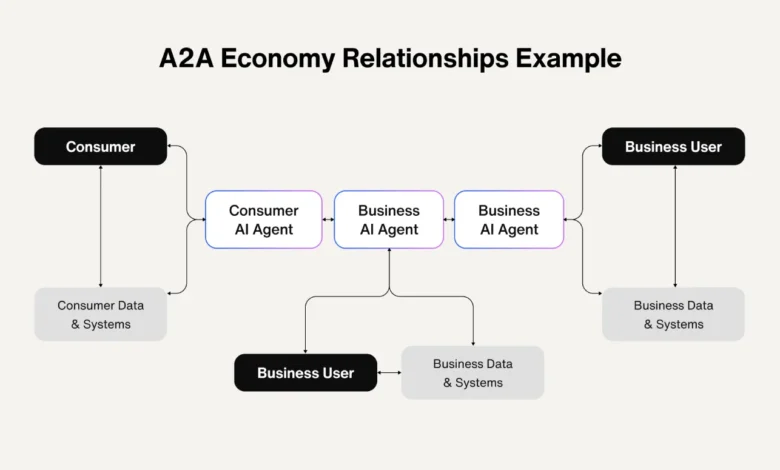
For years, retailers have focused on omnichannel strategies to create seamless AI-powered customer experiences across platforms. That approach is now being overtaken by omnipresent AI: intelligent systems that operate across touchpoints, adapting in real-time and personalizing interactions at scale.
I’ve been having more conversations than ever with companies looking to implement AI agents beyond customer service. Businesses are exploring ways to use AI for transactions, supply chain management and revenue growth. The Agent-to-Agent (A2A) economy is no longer a theory. AI agents are already negotiating prices, managing inventories and handling post-purchase engagement — essentially, talking to each other. No human involvement is required.
This shift is redefining how retail operates. AI is making commerce more dynamic, allowing businesses to respond instantly to customer needs while automating critical processes. With 70% of executives planning to implement AI-powered solutions by 2025, according to Deloitte, the next phase of retail will be shaped by these intelligent agents working behind the scenes.
Below, I’ll explain how the A2A economy is transforming retail, the key ways AI agents are driving operational efficiency and customer engagement, and why 2025 is the year this shift accelerates.
The A2A Economy: A New Standard for Retail
AI agents are evolving from tools that assist humans to autonomous systems that handle tasks end-to-end. Retailers are rapidly integrating AI to automate demand forecasting, logistics and customer engagement, laying the foundation for full-scale retail automation through autonomous agents. A2A moves beyond isolated AI applications, creating networks of agents that communicate and execute tasks independently.
How AI Agents Are Reshaping Retail
Retailers are using AI to streamline operations and enhance customer interactions. AI agents are taking on roles that once required multiple systems and human oversight, accelerating retail automation in a few key ways:
- Personalized shopping assistance – AI anticipates needs based on behavior and makes recommendations before customers even start searching.
- Real-time pricing adjustments – AI factors in demand, competitor pricing and individual customer behavior to optimize pricing dynamically.
- Inventory and supply chain automation – AI monitors stock levels, communicates with suppliers and ensures availability without manual intervention.
- Customer support without human agents – AI handles inquiries, processes returns and resolves complaints efficiently, improving response times and customer satisfaction.
All indications point to retailers that integrate AI into these functions seeing improved margins, better customer retention, and faster service resolution times.
Consumer Trust and Adoption
As AI-powered customer experiences become more widespread in retail, consumer trust remains a key success factor. While some shoppers hesitate to rely on AI for purchases or support, adoption is growing as customers see the benefits of faster service and personalized experiences.
Three key factors are driving acceptance. First, familiarity breeds confidence. As AI becomes more common, skepticism declines. Second, convenience outweighs concerns. When AI consistently delivers better service, resistance fades. And third, retailers are making AI the default. Customers are engaging with AI whether they realize it or not, through recommendations, automated assistance and dynamic pricing.
Retailers that clearly communicate how AI improves the shopping experience will gain consumer trust more quickly.
Balancing AI Innovation with Data Privacy
While AI agents in retail enable hyper-personalization, they also raise concerns about ethical data use. Consumers are more aware than ever of how their data is collected and used, making transparency a key factor in AI adoption.
Retailers that prioritize ethical AI practices will be better positioned to gain consumer confidence. This means implementing clear policies on data usage, offering consumers control over their personal information, and ensuring that AI decision-making processes are explainable. Companies that communicate how data is used to enhance experiences, rather than just extracting value, will foster trust and long-term loyalty.
Privacy-first AI does not mean sacrificing effectiveness. Many leading retailers are adopting privacy-enhancing technologies that allow AI agents to function without directly accessing sensitive data. This includes techniques like federated learning, which enables AI to learn from user behavior without storing personal information. Striking the right balance between personalization and security will be essential for AI-driven retail to reach its full potential.
Why 2025 Will Be a Defining Year
The rapid evolution of AI is setting the stage for a major retail transformation in 2025. Several converging trends are accelerating AI adoption at an unprecedented pace.
AI models are becoming more advanced, capable of understanding context, recognizing patterns, and making highly accurate predictions. This increased sophistication is reducing the margin of error in AI-driven decision-making, making businesses more comfortable relying on automated systems. At the same time, the cost of AI implementation is dropping, making it more accessible to retailers of all sizes.
Retailers are also facing growing competitive pressure to adopt AI. As more companies integrate AI agents into their operations, consumer expectations are shifting. The ability to provide instant customer support, personalized recommendations, and automated logistics is quickly becoming the industry standard. Businesses that fail to adopt AI will struggle to meet evolving customer demands and risk losing their relevance.
Don’t Take A Wait-and-See Approach
The A2A economy is no longer just a concept; it is actively reshaping the way retailers operate right now. AI agents are optimizing inventory, automating customer interactions, and streamlining supply chains. Businesses that move quickly to adopt AI-driven models will gain a significant advantage, setting themselves apart as leaders in efficiency and customer engagement.
For retailers, the path forward is clear. AI should no longer be seen as an experimental technology but as a fundamental part of business strategy. Companies that delay adoption will find themselves playing catch-up in an increasingly AI-driven market. The smartest retailers are already talking to folks like me and investing in AI to future-proof their operations and enhance customer relationships.
The question businesses should be asking right now is, “How do I get started?” As I said before, AI thrives on data. As AI collects more interactions and data as part of the retail experience, the better the technology will get at helping businesses enhance their relationships with customers. That means early adopters will not only stay ahead of their competition but will help define the future of commerce. It’s evident that the time to act is now.




